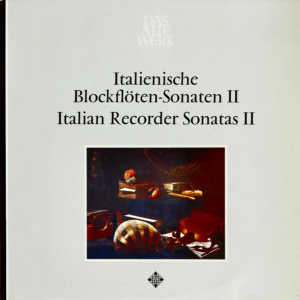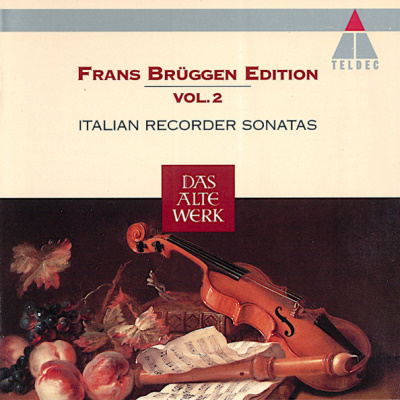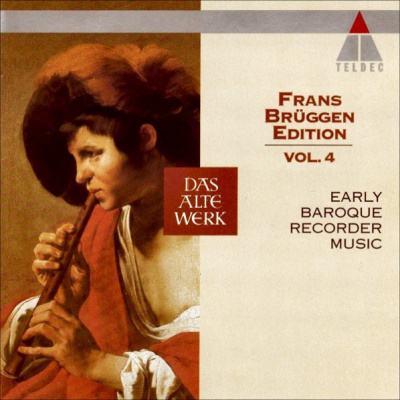 |
|
1 LP -
SAWT 9589-B - (p) 1973
|
 |
| 1 CD -
4509-93669-2 - (c) 1995 |
 |
| 1 CD -
4509-97466-2 - (c) 1995 |
|
| ITALIENISCHE
BLOCKFLÖTEN-SONATEN II |
|
|
|
|
|
|
|
|
| Girolamo
FRESCOBALDI (1583-1643) |
Canzon
per Canto solo e Basso continuo ("La
Bernardinia") - für eine Stimme und
Basso continuo *
|
(1) |
|
3' 21" |
A1 |
| Gian Paolo CIMA (um 1570) |
Sonate
in D - aus "Concerti
ecclesiastici... Milano 1610" *
|
(2) |
|
4' 19" |
A2
|
|
Sonate
in g - aus "Concerti
ecclesiastici... Milano 1610" *
|
(3) |
|
4' 08" |
A3 |
| Benedetto MARCELLO (1686-1739) |
Sonate d-moll für Blockflöte und
B.c., Op. 2, 11 - aus "XII Suonate a
Flauto solo con suo Basso..." ** |
(4) |
|
8' 08" |
|
|
-
Adagio
|
|
2' 21" |
|
A4 |
|
-
Allegro |
|
2' 04" |
|
A5 |
|
-
Largo |
|
1' 18" |
|
A6 |
|
-
Allegro |
|
2' 25" |
|
A7 |
| Arcangelo CORELLI (1653-1713) |
Sonate
F-dur für Blockflöte und B.c. - Nr.
4 aus "12 Sonate a Violino e Violone o
Cimbalo" Op. 5 ** |
(4) |
|
11' 23" |
|
|
-
|
|
2' 26" |
|
B1 |
|
- |
|
2' 26" |
|
B2 |
|
-
Vivace |
|
1' 23" |
|
B3 |
|
-
Adagio |
|
2' 28" |
|
B4 |
|
-
Allegro |
|
2' 40" |
|
B5 |
| Francesco Maria
VERACINI (1690-1768) |
Sonate
a-moll für Blockflöte und B.c. -
Sonata sesta aus "Sonate a Violino, o
Flauto solo, e Basso... Venezia. 26 Luglio
1716" **
|
(4) |
|
9' 35" |
|
|
-
Largo
|
|
1' 28" |
|
B6 |
|
-
Allegro |
|
2' 12" |
|
B7 |
|
-
Allegro |
|
2' 59" |
|
B8 |
|
-
Allegro |
|
2' 56" |
|
B9 |
|
|
|
|
|
|
Frans
BRÜGGEN, Blockflöten:
- Blockflöte (1) in c'' nach alten
Vorbildern um 1650 von Friedrich von
Huene, Boston, USA
- Blockflöte (2) in c' nach alten
Vorbildern von Joachim Peter, Berlin
- Blockflöte (3) in c'' nach altern
Vorbildern um 1600 von Klaus Scheele,
Bremerhaven
- Blockflöte (4) in f' von O. I. Bressan,
London, um 1720
Anner BYLSMA, Violoncello
(Matteo Gofriller, Venedig 1699)
Gustav LEONHARDT, Orgelpositiv
und Cembalo:
- Orgelpositiv nach alten Vorbildern,
Mitte des 17. Jh., von Klaus Becker,
Kupfermüle *
- Cembalo Giovanni Natale Boccalari,
Neapel 1699) **
|
|
|
|
|
|
Luogo
e data di registrazione |
|
Amsterdam (Holland) -
Giugno 1972
|
|
|
Registrazione:
live / studio |
|
studio |
|
|
Producer |
|
Heinrich Weritz
|
|
|
Prima Edizione
LP |
|
Telefunken "Das Alte
Werk" | SAWT 9589-B | 1 LP -
durata 40' 54" | (p) 1973 | ANA
|
|
|
Edizione CD |
|
Teldec Classics
"Frans Brüggen Edition" Vol. 2 |
LC 6019 | 4509-93669-2 | 1 CD -
durata 72' 43" | (c) 1995
| ADD | (Marcello, Corelli,
Veracini)
Teldec Classics
"Frans Brüggen Edition" Vol.
4 | LC 6019 | 4509-97466-2 |
1 CD - durata 58' 32"
| (c) 1995 | ADD |
(Frescobaldi, Cima)
|
|
|
Cover
|
|
Stilleben "Strumenti
musicali". Gemälde von Evaristo
Bsschenis (Bergamo 1617-1677)
|
|
|
Note |
|
-
|
|
|
|
|
Instrumental
works make up only a very
small part of the creative
output of Frescobaldi, the
last great Italian organ
master of the baroque era,
but nevertheless it was
precisely because of his
many organ and keyboard
works that he achieved fame
as a composer.
In the book of canzonas,
which appeared in three
versions with the contents
amended each time, we find
the present wotk described
as "La Bernardinia" in the
second edition (1628).
Frescobaldi's instrumental
canzonas are so-called
"variation canzonas".
Several small passages
contrast with one another in
even and uneven time, and
Frescobaldi welds them
together thematically in a
most artistic manner in
order to effect a uniformly
cohesive form.
Frescobaldi's contemporary
Gian Paolo Cima was musical
director and organist at the
"Chiesa S. Celso" in Milan.
By way of ingeniously
integrated chromatic
passages he endowed his
"Sonata in D" with a
particular charm. However,
his works, like those of
Frescobaldi, vary
considerably from the other
compositions on this
recording: They afford equal
opportunities to the solo
and bass instrumemnts i the
thematic work, whereas
Marcello, Corelli and
Veracini clearly bring the
solo instruments into the
foreground and the main
function of the basso
continuo consists merely in
providing a harmonious
basis.
Marcello, who composed many
vocal and instrumental
works, also proved himself
as a writer: In his spiteful
satire "Il Teatro alla moda"
he pokes fun at contemporary
opera with his sarcastic
suggestions. In his
instrumental compositions
the tone idiom moves
strictly within the bounds
of what Padre Martini called
the "stile osservato". As
opposed to the vocal works,
the composer secceeds in
formulating the small
dimension movements of the
recorder sonatas adroitly
and with inventiveness.
Corelli's works provide a
second highlight in the
field of instrumental
compositions. The 4th Sonata
in F major originates from a
collection of "12
Sonate a Violino e Violine o
Cimbalo" op. 5, which
Corelli published with a
dedication in Rome on 1st
January, 1700. By 1720 no
less than 20 reprints of the
popular sonata collection
appeared in Europe. In these
sonatas Corelli enriches by
a fifth fast movement the
classical four-movement
standard church sonata which
he himself had founded: The
first slow movement, which
offers many possibilities
for stylish embellishment,
is followed by a fugue-type
allegro and the inserted
vivace. After the adagio
composed in the parallel
minor key a virtuose-style
allegro concludes the
sonata.
Veracini, one of the
greatest violinists of his
time, presented his early
work "Sonate a Violino o
Flauto solo e Basso" to the
Elector of Saxony Prince
Friedrich August in 1718.
Veracini's self-willed,
personal style of
composition is already
evident in the A minor
sonata in this collection.
He gives it, also
externally, a completely "non-classical"
form: adagio - allegro -
allegro - allegro.
Elisabeth
Harnoncourt
English
translation by Frederik
A. Bishop
|
  |
|
|